Contact: Min Fan, USHCA Executive Director contact@usheartlandchina.org
Beyond ZOOM: USHCA’s First Delegation Opens New Doors for U.S.-China Collaboration in Agricultural Education
April 25, 2022 - Jefferson City, MO
Two years after the pandemic shut down our in-person programs, conditions have finally improved enough to allow us to resume domestic travel. Even though delegations to China are out of the question at the moment, we were able to organize our first small domestic delegation from April 18-22 to promote agricultural education exchanges between the U.S. and China working with the 1890 Foundation, which represents 19 land grant universities (LGUs) designated through the Morrill Land Grant Act of 1890. Our small delegation was welcomed by Tuskegee University and Tennessee State University, where Vice President Kamala Harris gave the 2022 commencement speech three weeks later. We also visited the Lone Oaks Farm, an innovative STEM education farm that is part of the University of Tennessee-Knoxville extension program.
Tuskegee University: Tuskegee-Selma-Montgomery, Alabama
Tuskegee University is a renowned historically black land-grant university in Tuskegee, Alabama. The campus is designated as the Tuskegee Institute National Historic Site by the National Park Service. The university was home to scientist George Washington Carver and to World War II’s Tuskegee Airmen. USHCA started working with Tuskegee University when we honored George Washingon Carver as one the 3 scientists that inspired the inaugural virtual U.S.-China Ag Roundtable in 2021. Then Dean Walter Hill of Tuskegee University’s College of Agriculture, Environment and Nutrition Sciences (CAENS) participated in the first virtual U.S.-China Ag Education Leaders Dialogue in March 2021. USHCA was later asked by Dean Hill to provide 2 segments of programs about China for the Professional Agricultural Workers Conference (PAWC), which was initiated by Booker T. Washington in 1894. For the first time in its long history, PAWC offered a program about China in its 2021 conference with support from USHCA.
When we arrived at the campus of Tuskegee University on April 18th, we were greeted by Dr. Raymond Shange, Director of the Carver Integrative Sustainability Center; 1890 Extension Administrator, Cooperative Extension & Associate Dean. The Carver Integrative Sustainability Center (CISC) was established in 2010 by an initial memorandum of understanding signed by then Tuskegee University President Gilbert Rochon and then United States Secretary of Agriculture, Tom Vilsack. The CISC serves as a science-based research and resource center focused on technologies, programs, and policies that enhance the profitability and sustainability of small farmers, ranchers, landowners, and rural communities. The center functions in the tradition of George Washington Carver as a regional, national, and international resource in developing and sharing holistic, earth, farmer, and consumer-friendly agricultural and food innovations, with specific activities including applied research, collaborative education, and service.
Dr. Shange gave our small delegation – Dr. Xiaopeng Pang (Chinese visiting scholar from Renmin University), Dr. Lou Swanson (USHCA advisor, retired sociology professor, former Vice President of Extension at Colorado State University), Min Fan (USHCA Executive Director), and Jason Conley (USHCA Program Associate) – an introduction of the college and its extension responsibilities. Dean Olga Bolden-Tiller, who was traveling that day, also connected with us via Zoom. Following a tour of the state of the art James H. M. Henderson Hall Agriculture and Life Sciences Teaching, Research and Extension Building, our delegation walked around the campus to the monument for the educator and founder of Tuskegee University, Booker T. Washington.
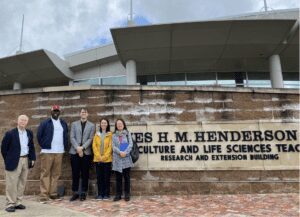
Dr. Lou Swanson, Dr. Raymond Shange, Jason Conley, Min Fan, Dr. Xiaopeng Pang
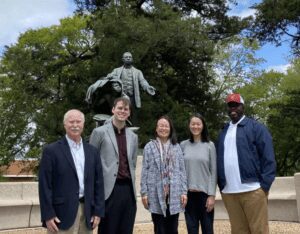
Lifting the Veil of Ignorance is a monument dedicated in 1922 to educator Booker T. Washington.
Dr. Shange then took us to Selma, Alabama to the Black Belt Market Innovation Center (BBMIC), which also hosts Tuskegee University’s Selma Rural Agriculture Extension office. On the drive there, we learned that after generations of underdevelopment, emigration, and negligent policy, the Southern Black Belt Region has become associated with food insecurity, educational challenges, and lack of economic opportunity. Over lunch at BBMIC, we learned from the extension coordinators and local farmers how the agricultural extension programs at Tuskegee University have taken the latest agricultural research and transferred that knowledge down to the fields in a more practical, applicable way to help the rural farming community.
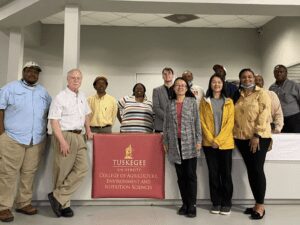
USHCA delegation with Tuskegee University hosts and local farmers at Black Belt Market Innovation Center (BBMIC). Selma, Alabama.
After Selma, Dr. Shange took us to visit an Urban Agriculture Extension project in downtown Montgomery. We drove along the Civil Rights Trail, crossing the Edmund Pettus Bridge, the site of the brutal Bloody Sunday beatings of civil rights marchers during the first march for voting rights in 1965, and arrived at the historic Peacock Track Community in the heart of Montgomery.

Crossing the Edmund Pettus Bridge, now a National Historic Landmark
John Myers, an Urban Agriculture and Natural Resource Extension Agent from Tuskegee University and local activist Vincent Hall greeted us at the former downtown historic neighborhood Peacock Track Community. They showed us the Mount Zion African Methodist Episcoal AME Zion Church, a historical landmark, where Martin Luther King had given a speech and where civil rights marchers received refreshments on their historical march from Selma to Montgomery in 1965. We also learned how this neighborhood around the church was destroyed when two major highways were later placed right near it. It was a heavy-hearted moment for our small delegation to be standing in the midst of empty lots with steps leading to nowhere.
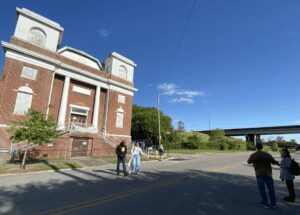
Outside the Mount Zion AME Zion Church with the two major highways are visible in the background. In front of the church: John Myers and Dr. Rui Chen. Across the street: Vincent Hall and Dr. Xiaopeng Pang.
In this landscape of systemic racism, Tuskegee University’s Urban Agriculture Innovation Center broke ground in February 2020. It is working with the City of Montgomery to assist the local community and decrease food insecurity found within urban areas. The innovation center will focus on offering the community a public garden, as well as providing education tips and promoting entrepreneurship. Dr. Walter Hill, former Dean of CAENS, and Dr. Rui Chen, Assistant Professor Agricultural and Resource Economics also joined us at the Peacock Tract Community to share their thoughts on the potential of Ag extension to transform our communities urban or rural.
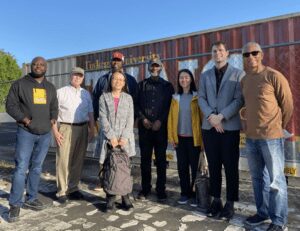
Outside the Urban Garden project of the Urban Agriculture Innovation Center.
John Myers, Dr. Lou Swanson, Dr. Raymond Shange, Dr. Xiaopeng Pang, Dr. Walter Hill, Min Fan, Jason Conley, and Vincent Hall.
Tennessee State University: Nashville-Murfreesboro, Tennessee
The next stop of our visit was Tennessee State University (TSU) in Nashville. TSU was recommended to us by the 1890 Foundation due to its leadership in Ag Education and being the only 1890 LGU that is located in a major metropolitan setting. USHCA has also partnered with Dr. Keisha Brown of TSU in virtual programs in 2021. Dean Chandra Reddy and Dr. Latif Lighari of the College of Agriculture, Human & Natural Resources hosted a dinner for the USHCA delegation. Many partners from Tennessee that we have been working with via ZOOM these past two years joined us for dinner.
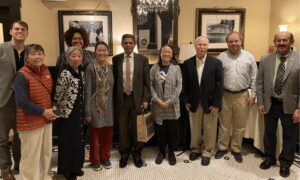
Attendees at the welcome dinner in Nashville. Jason Conley, Dr. Suping Zhou, Lulu Copeland, Dr. Keisha Brown, Min Fan, Dean Chandra Reddy, Dr. Xiaopeng Pang, Dr. Lou Swanson, Amos Smith, and Dr. Latif Lighari
The remaining days of the visit with Tennessee State were filled with intense exchanges about national agriculture extension tactics from university to university. Tennessee State University’s 4-H and youth development team also shared their work which are of great interest to Dr. Pang whose research interests included agricultural education for the youth. The group also received a presentation of how extension works in different countries, including Dr. Lalitha of Acharya N. G. Ranga Agricultural University in Hyderabad, India, Dr. Pang who explained how extension works in China, and the American system from Dr. Swanson.
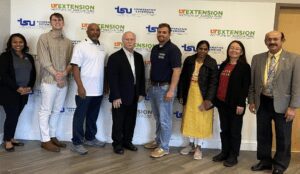
Featured in this photo from left to right is Misty Layne-Watkins (far left), Jason Conley
(left), Anthony Tuggle (left), Dr. Lou Swanson (center left), Logan Hickerson (center right), Dr. Lalitha (right), Dr. Xiaopeng Pang (right) and Dr. Latif Lighari (far right.)
After their session at Nashville, the group traveled to Tennessee State University and University of Tennessee’s joint extension site in Murfreesboro. Dr. Lalitha, Dr. Swanson, Dr. Pang, and Jason Conley were among the group that was greeted by Dr. Lighari and his Murfreesboro extension staff. There, the group was challenged on conventional ideas of extension and learned about Murfreesboro local challenges and points of success. Unique to other extension offices, beekeeping and home owning are two areas in which the TSU/UT Murfreesboro often helps its community.
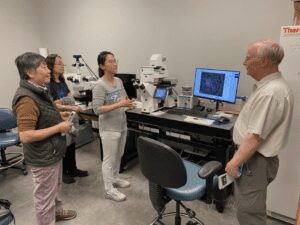
In this picture, Dr. Lou Swanson and Dr. Xiaopeng Pang meet with Dr. Suping Zhou, Research Professor for the Department of Agricultural and Environmental Sciences at Tennessee State University and one of her graduate students as they explain TSU’s plant pathology program and DNA extraction process to examine plant diseases and growth patterns. Plant pathology is an area in which TSU’s extension offices work often and is a considerable area for academic collaboration with Chinese universities.
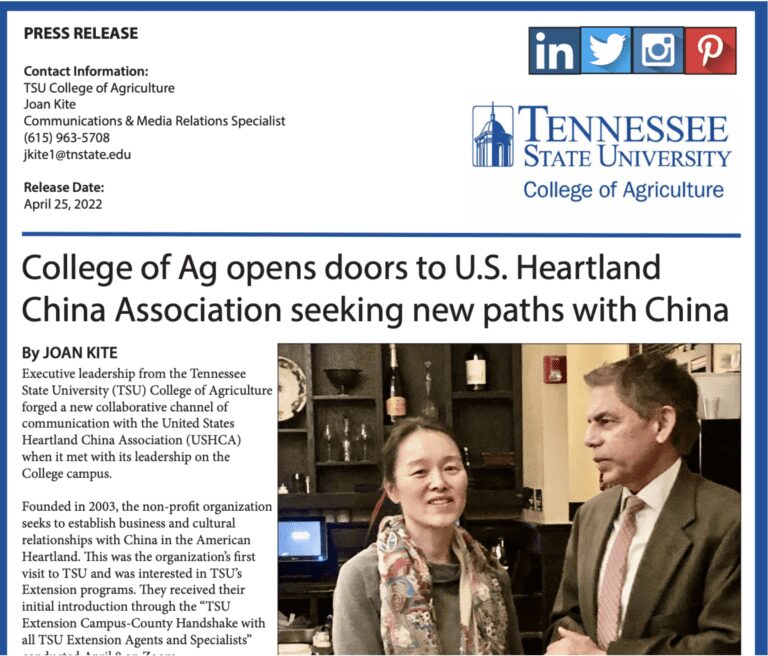
A press release was published from the Tennessee State University’s College of Agriculture. Dr. Chandra Reddy, Dean of TSU’s College of Agriculture, noted “global food security is an important objective for the college and in that vein we are always willing to share our expertise and experiences with everyone. We hope this partnership with USHCA helps us to recruit Chinese students and potentially results in faculty exchanges.”
Lone Oaks Farm: Middleton, Tennessee
The last stop of our delegation to the south was the Lone Oaks Farm in Middleton, Tennessee. This farm is administered by the University of Tennessee Extension programs and is one of the Extension offices in Hardeman County. The farm is a beautiful 1,200 acres that encourages agricultural-based STEM training for the local community. The emphasis of the farm is for youth to lean on in a hands-on way. Teachers in the area often request the Lone Oaks staff to help them with teaching current science and math concepts, as well as getting exposed to agricultural practices. The farm also raises and breeds cattle and serves as a sale point of hundreds of heifers annually.
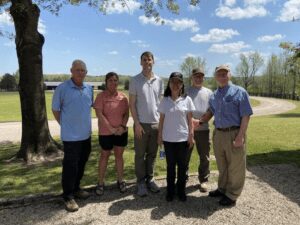
Featured above in order is Ron Blair, Director of Lone Oaks Farm; Penny Russell, Extension Assistant for Lone Oaks Farm; Jason Conley, Program Associate for U.S. Heartland China Association; Dr. Xiaopeng Pang, Renmin University; Gary Rogers, 4-H Agent/County Director; Dr. Lou Swanson, Colorado State University.
Reflections
Reflecting on the trip to the south Dr. Pang was most impressed by Youth Development efforts at all the institutions we visited. She believed that the 4H (elementary age) plus Future Farmers of America (Highschool) model are very good. In China, agricultural extension falls under the Ministry of Agriculture and Rural Affairs, but they don’t provide any youth development programs. Agriculture is also not covered by vocational programs. This is an opportunity for China as it strives to augment and modernize its agricultural workforce.
Dr. Swanson also pointed out that the American Extension system is unique in the world. Extension is hosted at land grant universities in the U.S., while in other countries, including China, agricultural education is scattered between many ministries. In China, the Ministry of Education, Ministry of Science & Technology, and Ministry of Agriculture and Rural Affairs all touch agricultural education with competing interests often. However, at provincial level, there is much more collaboration, as he witnessed in his collaborations with Anhui Province
For the 1890 LGU community, we also learned that education exchanges with China are important because global challenges require global talents and global collaboration. Experiences working with China leads to better understanding of global citizenship for their faculties and students. There is also a unique opportunity to collaborate with China to help Africa since many 1890 LGU work in Africa. Both Tuskegee University and Tennessee State University expressed interest in working with Chinese Agricultural Education institutions with the help of USHCA.
This project was made possible with the support of a grant from the Henry Luce Foundation. USHCA also wishes to acknowledge the sponsor of Dr. Xiaopeng Pang’s visiting scholar arrangement at the Colorado State University, IIE.
We are delighted that this small delegation has opened new doors for U.S.-China Collaboration in Ag education. We look forward to facilitating more of these exchanges in the near future.
The US Heartland China Association is a 501(C)3 bipartisan organization that is dedicated to building healthy ties between the heartland region of the United States and the People’s Republic of China. USHCA builds those ties through promoting exchanges in culture, education and business. More information is available at USHeartlandChina.org.

